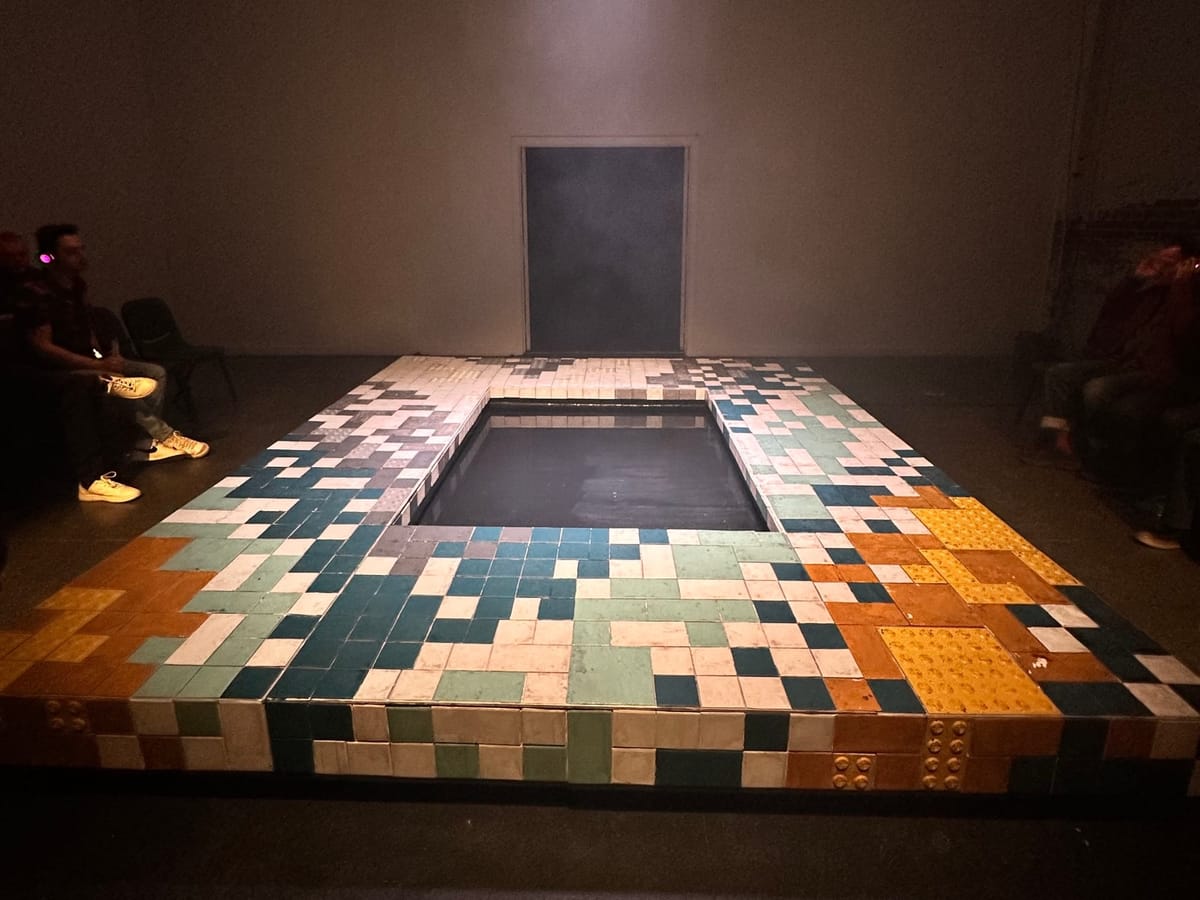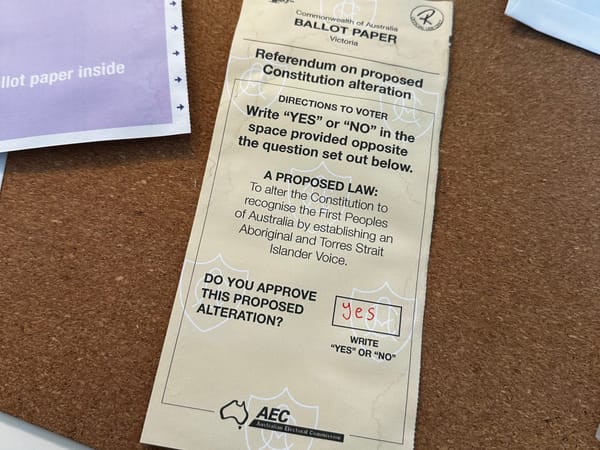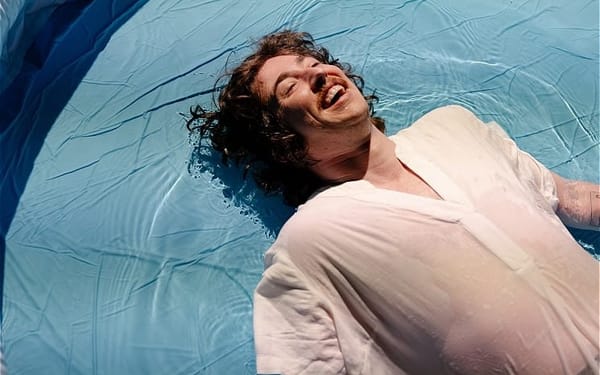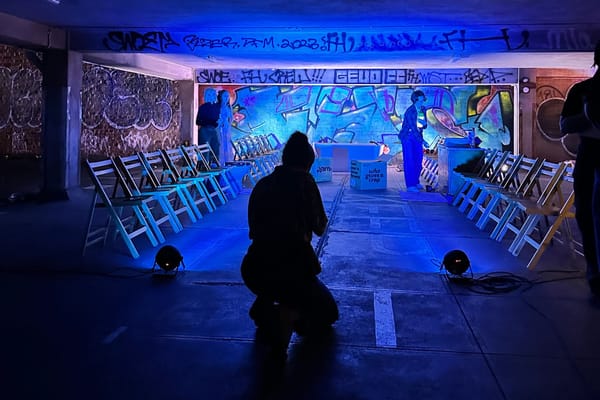A long overdue review of my favourite show at Melbourne Fringe (and a working theory of what makes theatre, theatre)
A review of No Seasons by Oli Ayres, presented by Skint at Melbourne Fringe Festival 2025

I was finishing up my theatre degree in 2021, right when Victoria and its theatres were locked down for what felt like years on end. My graduate show was ‘devised’ over Zoom, and what we produced was basically a film made in twenty isolated houses across the country. I don’t think I ever watched our final output, because what we made felt so antithetical to what we were studying. What is theatre if it’s not live?
At the time it felt like that might be the critical determiner of theatre: liveness. Maybe a TikTok live stream could be theatre, but a random trend couldn’t be. Maybe theatre could be felt on a Minecraft server, but a Youtube Let’s Play would kill it. We tell ourselves that the magic of theatre is that anything can go wrong, so the thing that makes theatre theatre must be the requisite conditions to let anything go wrong. This art-form must be some sort of space where we witness the magic of things not failing. Right?
I’m not sure.
I felt like this last Melbourne Fringe was filled with shows which competed on the possibility of failure: What if we tattooed someone on stage? What if the show was performed by the audience? What if there was a new unrehearsed actor every night? What if we did it on a drive through Fitzroy with an audience member sitting in the backseat? What if the audience voted on how it should end? What if kids decided on what media we censor? What if there was a massive animatronic worm on stage?
You get the point.
There were so many ways for so many of these shows to fail, and it was remarkable and exciting and astonishing that they didn’t. But I don’t know if these competing possibilities for failure made for better theatre. You know?
My favourite show of the program—by a long-shot—was Oli Ayres’ No Seasons, a stripped back reflection on inheritance, legacy, and what we owe each other. Easily one of the best things I’ve seen all year, it continues Ayres’ streak of making unmissable theatre.
Upon entering the venue we were given the option of choosing a set of headphones based on our relationship to parenting and caring for people: are we already looking after someone in our lives? Do we one day want to? Or not?
From there we take our seats around a reflecting pool bordered by a mosaic made of tactile tiles which look like they were lifted from a suburban train station. The show starts and we listen to a conversation in our headphones, while Ayres has a drawn out communion with the water in the pool.
In my headphones, I ended up hearing Ayres in conversation with his mom, about her childhood and family and adoption. The heart of this work is Ayres’ decision to have his eggs removed before transitioning, and the big question of what do with those eggs now. Now that he’s older and has chronic illnesses and maybe doesn’t want kids what’s he meant to do with a bundle of eggs on ice? Especially with the world going as it is? What if he gave them away? What if he met the kids one day? And in between all the big questions and not-yet-big-enough answers is a heart-openingly vulnerable conversation between his mom and him. Where did she come from? And where might his offspring sit in this big messy web?
In the silences of this conversation I can hear flickers of other voices, I can identify one as Kaite Head, the producer on the show and Ayres’ partner, talking about his experiences with addiction. From conversations with others afterwards I figure out that these are entirely different audio tracks, entirely different shows for those who are or might actually want to be a parent (unlike me).
Aside from a couple theatrical flourishes towards the end and a stray pebble or two, that’s basically the entire show. Strikingly unadorned and yet I was left changed in the way all good art changes you. It felt like standing in a shower with the hot water cascading over me for an entire hour, an enclave to think about my own family and lineage and place in the world.
So why No Seasons? What did this simple little show have going for it that felt absent in so many other shows at Fringe? I mean, if the possibility of failure is what makes theatre so good then this wouldn’t have passed muster. It felt impossible for this show to fail—all that really had to happen was for me to put on headphones and watch Ayres move.
Forgive me for sounding pompous here, but I think it comes down to the fact that Ayres is a master of presence. He seems to understand that the magic of theatre, the thing that makes it the one of the most potent & lasting art-forms is the fact that from the stage, he can see you back. He can feel you. He witnesses you as much as you witness him, putting ourselves into a position of vulnerability much like the one he faces baring his soul on stage.
I think this is the thing that makes theatre great—any old art-form can be live, but not much can be present. A book will never feel your heart breaking, nor could a movie revel in your laughter. Theatre, on the other hand, lives and dies on the network of relationships that emerge in a dark house.
Ayres understands and wields the basics of this art-form with such deftness: eye contact, breathing, seeing, reciprocity. I don’t even care there’s not much adornment to this work, because what we have instead is something that feels raw and true and generous and reparative. I’m giddy thinking about it.
In a conversation with Ayres after the fact, he mentioned to me that he is very adamant about not having to bump in or out his own work, that he wants to preserve his energy for the work and his own artistry. I don’t know if those motivations are why this show and his last rely on headphones to communicate most of the content or if it’s something else—to create a psychological distance between the ideas in the work and the labour of presence maybe?
What I do know is that he’s found a mode of performance which really works, something that comes from a rigorous care for himself, and manifests in rigorous care & accessibility for his audience. You can’t have one without the other. It is such a relief to watch theatre made by someone who I trust cares about my experience of the show, and who I trust isn’t going to burn themselves out making sure I enjoy it. If I was smarter I would write a beautiful paragraph here about the disability politics at play here, about how we need more theatre which treats chronic illness and disability as a valid and rich starting point for artistic exploration. But I‘ve only just started reading about disability justice, so I’ll leave that for you to imagine.
I just feel so incredibly grateful to Ayres, I guess. He‘s the sort of artist who makes me feel like I made the right decision to move to Melbourne; who makes me feel how lucky I am to be in the same artistic community as he.
Anywho, I hope this mess of words conveys how much I really loved this show. Ayres is brilliant and excellent and I simply cannot wait to see all that he makes.





